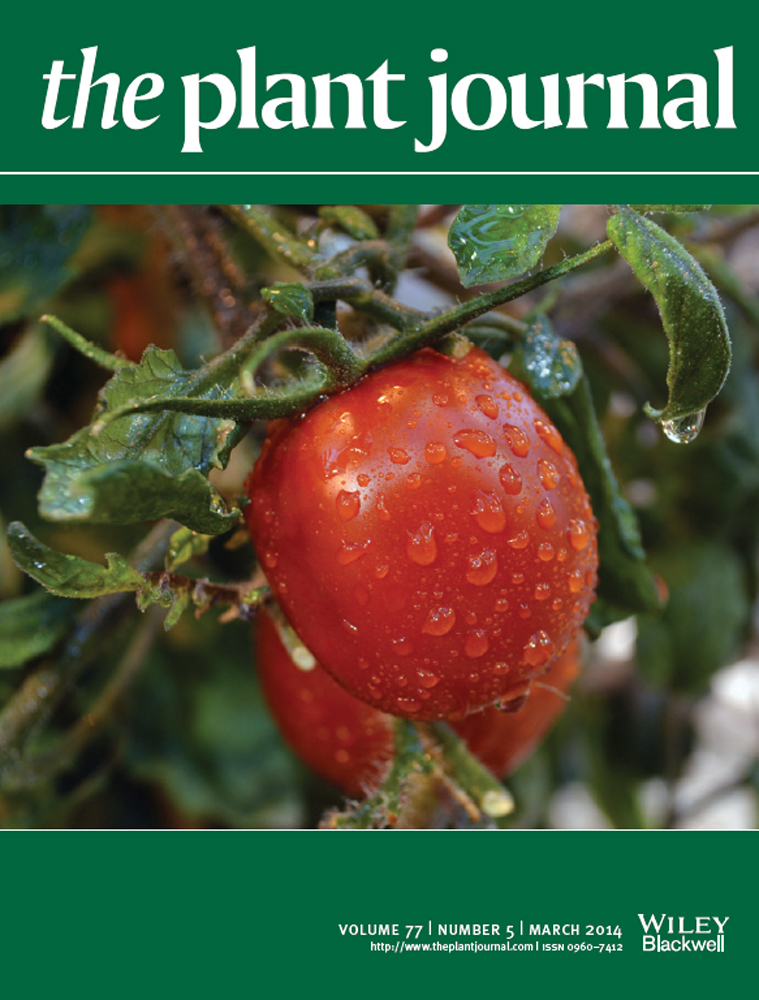Ver ítem
- xmlui.general.dspace_homeCentros e Institutos de InvestigaciónCICVyA. Centro de Investigación en Ciencias Veterinarias y AgronómicasInstituto de BiotecnologíaArtículos científicosxmlui.ArtifactBrowser.ItemViewer.trail
- Inicio
- Centros e Institutos de Investigación
- CICVyA. Centro de Investigación en Ciencias Veterinarias y Agronómicas
- Instituto de Biotecnología
- Artículos científicos
- Ver ítem
Silencing of the tomato Sugar Partitioning Affecting protein (SPA) modifies sink strength through a shift in leaf sugar metabolism
Resumen
Limitations in our understanding about the mechanisms that underlie source-sink assimilate partitioning
are increasingly becoming a major hurdle for crop yield enhancement via metabolic engineering. By means
of a comprehensive approach, this work reports the functional characterization of a DnaJ chaperone
related-protein (named as SPA; sugar partition-affecting) that is involved in assimilate partitioning in
tomato plants. SPA protein was found to be
[ver mas...]
Limitations in our understanding about the mechanisms that underlie source-sink assimilate partitioning
are increasingly becoming a major hurdle for crop yield enhancement via metabolic engineering. By means
of a comprehensive approach, this work reports the functional characterization of a DnaJ chaperone
related-protein (named as SPA; sugar partition-affecting) that is involved in assimilate partitioning in
tomato plants. SPA protein was found to be targeted to the chloroplast thylakoid membranes. SPA-RNAi
tomato plants produced more and heavier fruits compared with controls, thus resulting in a considerable
increment in harvest index. The transgenic plants also displayed increased pigment levels and reduced
sucrose, glucose and fructose contents in leaves. Detailed metabolic and enzymatic activities analyses
showed that sugar phosphate intermediates were increased while the activity of phosphoglucomutase,
sugar kinases and invertases was reduced in the photosynthetic organs of the silenced plants. These
changes would be anticipated to promote carbon export from foliar tissues. The combined results
suggested that the tomato SPA protein plays an important role in plastid metabolism and mediates the
source-sink relationships by affecting the rate of carbon translocation to fruits.
[Cerrar]

Autor
Bermudez Salazar, Luisa;
de Godoy, Fabiana;
Baldet, Pierre;
Demarco, Diego;
Osorio, Sonia;
Quadrana, Leandro Daniel;
Almeida de Souza, Juliana Beatriz;
Asis, Ramón;
Gibon, Yves;
Fernie, Alisdair R.;
Rossi, Maria Magdalena;
Carrari, Fernando;
Fuente
Plant journal 77 (5) : 676-687. (March 2014)
Fecha
2014-03
Editorial
Wiley; Society for Experimental Biology
ISSN
1365-313X
Formato
pdf
Tipo de documento
artículo
Palabras Claves
Derechos de acceso
Restringido
 Excepto donde se diga explicitamente, este item se publica bajo la siguiente descripción: Creative Commons Attribution-NonCommercial-ShareAlike 2.5 Unported (CC BY-NC-SA 2.5)
Excepto donde se diga explicitamente, este item se publica bajo la siguiente descripción: Creative Commons Attribution-NonCommercial-ShareAlike 2.5 Unported (CC BY-NC-SA 2.5)

